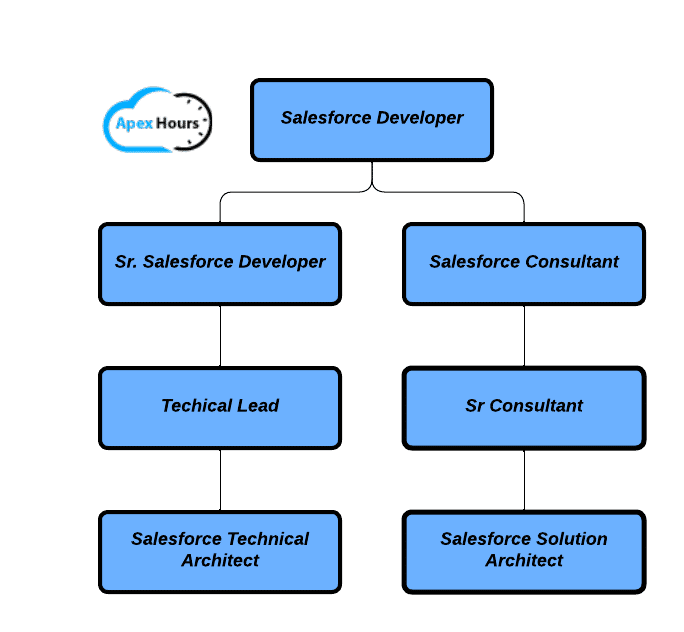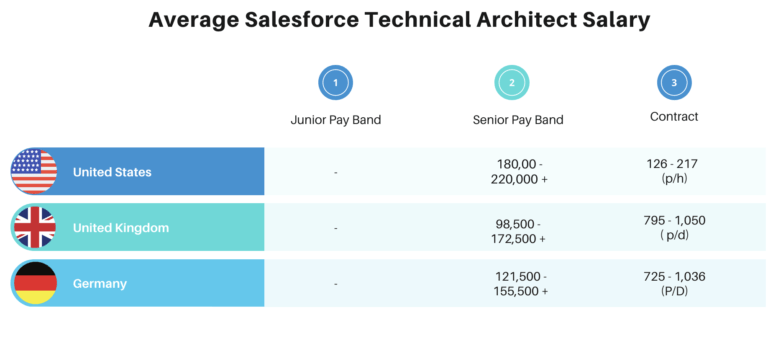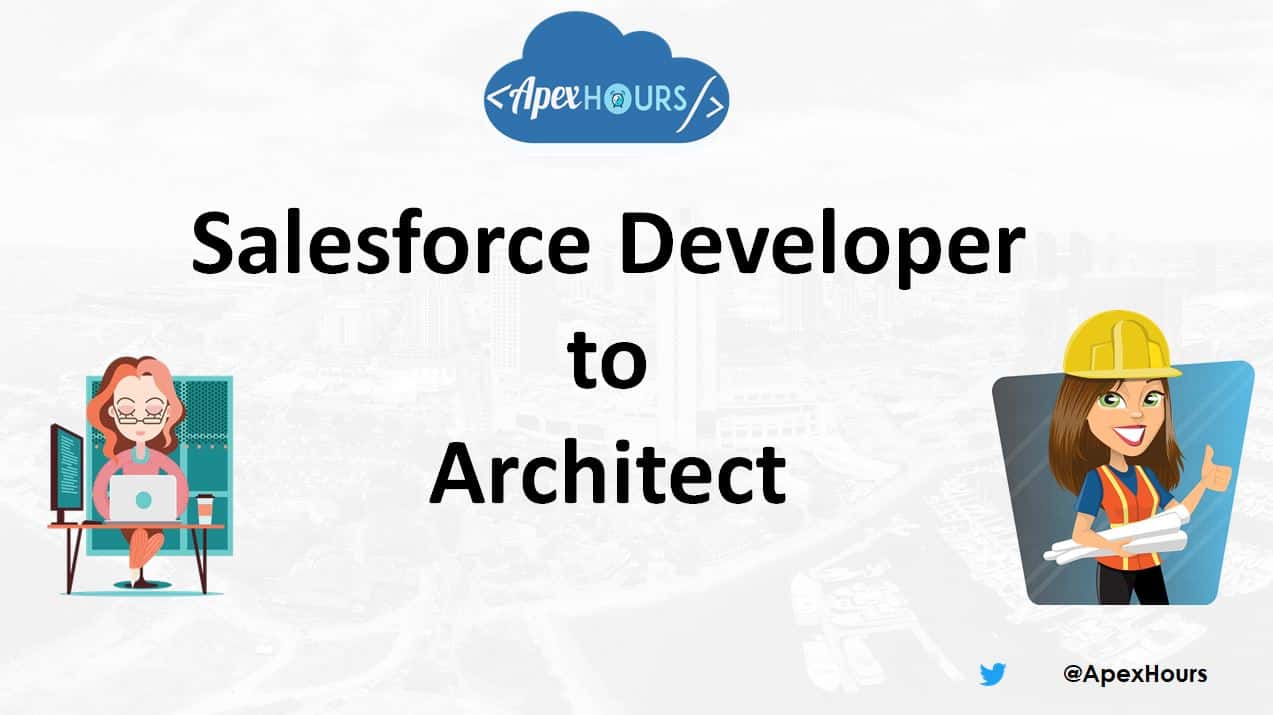In this post, we will look at the top considerations that are crucial to being a successful architect on the Salesforce platform. Even more, We will share approaches on what to focus on if you are a developer on the journey to becoming an architect. Being a good Architect means lifelong learning, practicing and goal setting. Let see how to start the journey from Salesforce Developer to Architect.
You want to Navigating your career from Developer to Architect. In this post we will include some key point that will help you to understand the complete journey From Salesforce Developer to Architect.
What Is Salesforce Developer?
Salesforce Developer is one of the most demanding skills in Salesforce industries. A developer is a programmer who builds applications for business. Salesforce Developers are ones who used to write the code on the Salesforce platform using Apex, JavaScript, Aura, and Lightning Web Components.
Check How to become a Salesforce Developer in 2023.
What is Salesforce Architect?
Salesforce Architects are the most trusted digital advisors and respected team leaders in the ecosystem. They’re big-picture thinkers and in-depth problem solvers who take pride in designing systems that can stand up to anything. The Salesforce Architect solves complex, large-scale customer challenges to produce secure, scalable, and high-performance solutions that maximize the full potential of the Salesforce Platform.
Check Become a Salesforce Certified Technical Architect (CTA).
Salesforce Architect Responsibilities
Based on name alone, it’s all about the technology, right? Not exactly, the role and success depends on so much more. Check our Meta Architect session. with Carl Brundage.

- Create architecture implementation and design plans
- Identify strengths, weaknesses and tradeoffs in design decisions
- Communicate design overviews to executive/business and technical audiences
- Guarantee application design supports the business requirements
- Collaborate with others on approaches needed to support strategy
- Ensure timely delivery of fully functional software for users
Difference between Salesforce Architect and Developer
Its very important to understand what Salesforce Developer do and what is Salesforce Architect?
| Salesforce Developer | Salesforce Architect |
| Develop the product and focuses on solving a specific problem | Plans, designs and reviews the construction of enterprise software, primarily cloud focused, and Salesforce related |
| One who write the code like Apex, VF, Aura and LWC | Hold the vision and foreses the system before it is build |
| Designed the code structure like trigger framework. | Think about bigger picture, Think Strategically and Communicate Effectively |
| Responsible for CI/CD | Responsible for data modeling, System landscape, Integration Architecture, Security design, Large Data Volume, System performance and etc |
Architect (CTA) Mindset
The knowledge you gain on each domain has to be applied in a business context , to solve for a business problem and achieve some business value. This is what a CTA mindset is about, bringing it all together and applying the right lenses to see the models. Here are simple ways to think like an Architect.

Think Strategically
- Think N numbers of steps in advance, think about how the situation could evolve, how levers could change
- Know the limitations and other workarounds
- Do the Risks assessment and mitigations honestly
Communicate Effectively
- A good architect not only knows the solution well but can explain it to different audiences as well.
- You know knowledge is no good if your stakeholders do not understand how it helps them
- Be it developers or business leaders, communicating in context and in a language your audience understands is key to being a top class architect
See the big picture
- The Architect always has an eye on the BIG PICTURE. He forced on Plans, designs and reviews the construction of enterprise software, primarily cloud focused, and Salesforce related
- Keeping at an eye on the end results and keeping the program on it’s right course to achieve the right Business Results is key to success.
Check out full session here
Some Myths for Salesforce Architect
Lets talk about some myths we always have for Salesforce Architect.
- To become a Salesforce Architect I first work as Salesforce Developer.
- Salesforce Architect must be able to write Apex and LWC.
- Salesforce Architect Know everything.
- Certification are the golden Standard.
From Salesforce Developer to Salesforce Architect
Let see how to become a Salesforce Architect from Salesforce Developer.

1. Create your own goal.
Self assessment is very important. You should know What do you enjoy doing? What’s your natural Strength and What do you want to continue doing and what do you want to drop in your future role? Being a good Architect means lifelong learning, practicing and goal setting.
2. Presentation Skills
Take every opportunity for practice and overcome your fears. Speak at user group and run workshop with a customer and learn 5 Skills Great Salesforce Consultants Have In Common.
3. Find a mentor
A mentor is really useful specially when preparing for the CTA board review. Someone who can give you honest feedback and help you structure your thoughts is a key success ingredient in your success.
4. Practice makes you perfect
Now that you know the 3 simple ingredients that make a good architect and you feel ready for your review boards how do you get there? Let me tell you something, it is not easy. Bringing together your breadth of domain knowledge into context specific architecture take practice. So all I can say is Practice, Practice Practice.
5. Feedback is a gift
Finally “feedback is a gift” accept it graciously . It’s a quality that can only help you be better every-time. Experience is the wonderful knowledge that enables you to recognize a mistake when you do it again.
6. Habit of thinking strategically
One of the awesome things about going through the whole grill of becoming a CTA is you naturally get into the habit of thinking strategically, thinking of the big picture, organizing your thought into business context etc.
7. What’s beyond CTA
The learning does not stop there, growth mindset is extremely important before and even after the review boards.
8. Check our Playlist
Check our Apex Hours complete playlist to understand the different point of architecture and path to CTA.
Further learning
- Sharing Architecture in Salesforce.
- Salesforce integration Patterns & Best Practices
- Building Scalable Solutions on Salesforce
- How Salesforce Query Optimizer works for LDV
- Pre-Sales Life Cycle in Salesforce
Please share some tips if you have for our audience.
FAQ’s
Yes, Salesforce Developer can become a Salesforce Architect. He need to change his mindset from module to big picture. Here is Salesforce Developer career path
For US-based Architects, the average salary you can expect is between $180,000 and $220,000, making it the highest-paid role from those discussed throughout this piece by a significant margin, with those in the UK reportedly earning up to £155,500 annually







One thing I’d add to your list of differences between a Developer and Architect is the latter needs to think in terms of “Patterns”. There are many patterns we seek to leverage as architects. This applies to all aspects of a project. It applies to integrations, record sharing, ERD relationships, coding, frameworks, services (e.g. Enterprise SOA patterns applied to Salesforce) and many other things as well. Some, will often refer to these patterns as “best practices”, but there are “anti-patterns” architects learn to look for as well which are important to consider as applications and orgs scale.
While it’s true that not all architects need to know how to write code, having the ability to understand code and interfaces is extremely helpful when it comes to these patterns. Without them, understanding the need for service oriented architecture, various layers of abstractions, and certain types of services will be much more difficult to understand and implement. I also feel it’s nearly essential for an architect to understand why certain frameworks are more desirable to implement than others; especially when the decision of which one to implement ultimately affects the outcome of their project.
Thanks Cal Smith. We totally agree with you. Really nice point you added.
Thanks for the rich info shared!
Would you guys have a place/link/community where we could find mentors to have even a 30min monthly call?
Tkx in advance for your support.
Join our Farmington Hill Developer Group
Hi, could you please attach the link to join
Farmington Hill Developer Group
We will share soon
Very nice post and informative.
Developer to Architect journey has been articulated very well. Thanks Amit and Team.
All the best for your Developer to Architect journey